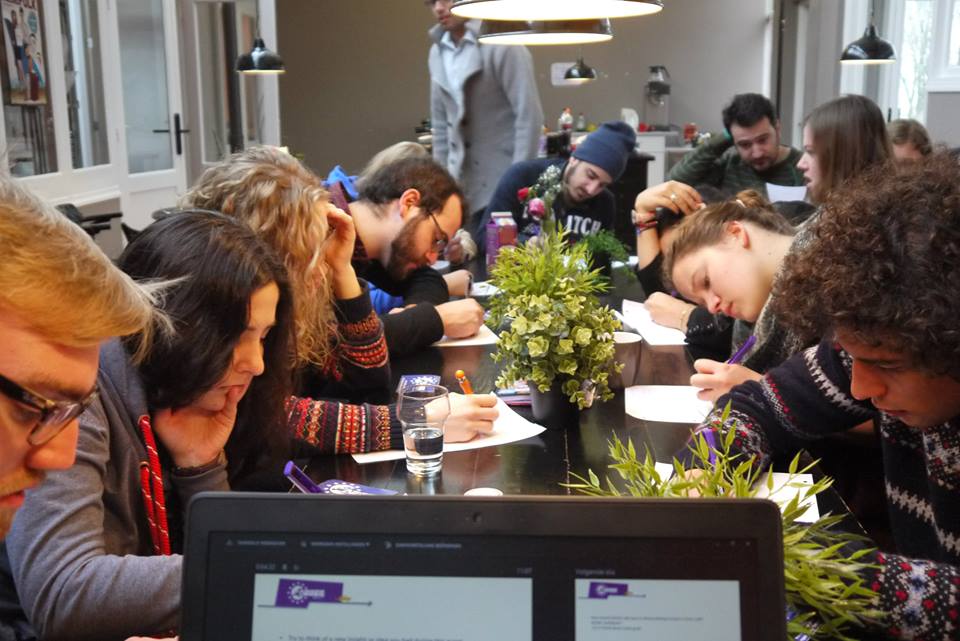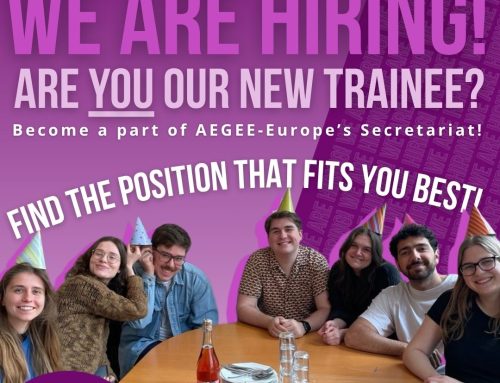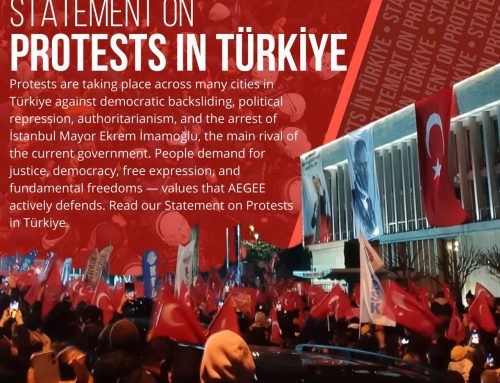AEGEE-Delft elaborates on the discussion about our future Europe. By Femke Lokhorst, President of AEGEE-Delft ’14-’15.  A four day event titled Europe and its identities. How divided is Europe took place in Delft last December discussing matters that are important to the future of the European union. The event was part of the FBY 2014 –The Franck Biancheri Year- financed by the AAFB Association des Amis de Franck Biancheri. FBY is an opportunity for AEGEE locals to contribute to European matters. Not per se to the ideas of someone, but to open a European level discussion about the future of Europe. As European citizens, we took this opportunity and organized a year of activities related to European politics. The final event was the Franck Biancheri Memorial Event in which Franck Biancheri was honoured for his contribution to the reinvention of Europe. Our event consisted of lectures, discussions and some less intense activities such as a trip to The Hague and a Franck Biancheri memorial ceremony. Some of the lectures were held by AAFB members who were really interested in the stories of our participants and joined us in our discussion. The lectures had quite different topics, but all topics were debatable. The main topics we elaborated on were the following: democratizing Europe, the European identity, centralizing or decentralizing, conflicts in Europe and separatism. On the last day, we asked our participants to write something about these topics. Here is what we gathered. ‘The European Parliament and the European cities have to work better with each other. In order to make the representation of the citizen more effective, we have to divide the responsibilities more clearly. Transnational parties should represent the European citizens on common European issues but their national interest should be defended by a national parliament within the European Parliament if there are any conflicts of interest. Within the regional and national level, the citizens must be informed better so that they can really wrap their head around the issues and get the representation of the citizens right and legitimate.’ on the topic of democratizing Europe. ‘The European identity doesn’t mean we are all the same. It means that we are all different. Being European and travelling around makes you realize it and makes you understand your own national identity better. Comparing your opinions with the ones of your fellow Europeans broadens your perception of the world through the understanding of cultural differences. The European identity implies the wish to cooperate and create something greater than the nations, uniting all Europeans in the same spirit and in believing in the same rights and values.’ on the topic of European identity ‘One of the ideas to make the EU closer to the people would be to decentralize the power of it. This could happen in different ways. An option would be to have the “department” of culture in Athens, the agriculture in London and so on. The advantage would be that people can identify more with the European level and that nations would profit (e.g. more money or jobs), but it would probably also make the communication within Europe more difficult. In our discussions we didn’t come to a conclusion whether it is better or not to distribute the power in Europe. What we all agreed on is that you need to have a structure that is organic in such a way that it has the capacity to adapt to conflicts and to difficult situations and decisions. The problem there lies in how you can change a democracy that is already working in such a way that nobody knows how to really participate.’ on the topic of centralizing or decentralizing ‘We addressed the conflict on a cultural level. Also the speaker gave us a big insight about the culture of Ukraine and the history it has with Russia. It really gave us an insight to the demonstrations and the development of the conflict, yet the presentation was really objective. We were given insight by Russians on how the conflict is presented by the media and what the role of the media exactly is in these countries. It was also interesting to realise that the Ukrainians have a conflict within their own country about their identity; Ukrainian, Russian or European? It was amazing to realize how we can actually have a discussion with so many nationalities about this conflict when we are not talking about politics, but about cultural values. Taking the conflict for what is actually happening now, and not for who is right or who is wrong. Sometimes we don’t need to find the solution. We can only try to understand. As a Ukrainian participant said to end the discussion: You should never be afraid to stand up for the rights that you believe in.’ on the topic of conflicts in Europe, Ukraine and Russia ‘A Scottish student that was allowed to vote in Scotland told us about his personal experience with the feelings of separatism among people in Scotland. What we came to realize is that Scotland can vote, but the majority doesn’t want independence. Catalonia cannot even vote. Some regions do not feel represented anymore by their national government, because in some cases, the power is in the hands of one city or one group. When regions do not feel represented by their country, the question is if anybody feels represented by Europe. In what way are nations such as the U.K. and Spain and an institution as the European Union different from one another? This is an interesting topic to elaborate on.’ on the topic of separatism. Power to the people of AEGEE! It seemed that a lot of our participants didn’t feel like they could actually work on big issues like these, but together we managed to think about a lot of things that we could all organize, like Informational events related with breaking news, election observation, the Democracy in practise project, making a ‘wish tree’ for Europe, thematic dinners, TEDx events or events like ours with multicultural discussions. We also asked what the role of AEGEE could be in all of this. Participants said that the FB year is really helping, but also that there is a lot of information in AEGEE about European politics that should be spread. We concluded that this is not the fault of AEGEE. You cannot just give all the information. Locals should actively participate on the political side of AEGEE. As we see it, there is need for discussion and to decently have this, you need to spread information about Europe, because most of our participants were surprised about how little they knew about almost every topic. Do you want to discuss the Ukrainian conflict with Russia? Get people with you that are from there, that have lived in all these stories. Do you want to discuss Europe’s policies? Make sure there is somebody who knows them as they are now. We can stumble upon these topics forever, but we don’t have to if we try to solve them together. We might not all have the same opinions, but our event was a small example of what an intelligent group of young people can understand about each other and can learn in only 4 days. Imagine what would be possible if the whole AEGEE network actively started organizing these discussions with so many different nationalities participating. Let’s reinvent Europe. Or at least try to have an opinion as the future generation of our union. We might be different in many ways, but the one thing we all have in common is that we believe in the European values. Let’s not forget them. We also asked our participants about what new insights they got through their participation in this event. Here are some of their thoughts. Europe is not as democratic as I thought it was. There are a lot of levels of bureaucracy that are not evenly distributed. An idea to improve that is to remove one bureaucratic level, like countries, and instead only have regions within the ‘country’ of Europe. The EP is not a functional working entity. Maybe the solution does not lie with the citizens, but perhaps the EP and the different entities of EU institutions need to be reorganized, especially the transnational parties. I learned to understand new point of views from people with other backgrounds. I would like to thank you for the unique experience that you provided to all participants of Frank Biancheri Memorial Event that you organized! Everything was so well organized and worked perfectly! I was impressed to see how many different people can collaborate and work harmoniously together and finally accomplish such a good quality event. The feedback we got from AAFB was more than pleasing. As Marie-Hélène Caillol, the wife of Franck Biancheri, said afterwards: You have really organized a high level conference with extremely well chosen topics, which gave us an insight on what themes are of concern for your generation in the context of crisis. Also for me, it was an experience I will not easily forget and I would like to thank Marie-Hélène Caillol, president of AAFB especially for this. I think we inspired a lot of people with this event, but in reality you were the one who inspired us.
A four day event titled Europe and its identities. How divided is Europe took place in Delft last December discussing matters that are important to the future of the European union. The event was part of the FBY 2014 –The Franck Biancheri Year- financed by the AAFB Association des Amis de Franck Biancheri. FBY is an opportunity for AEGEE locals to contribute to European matters. Not per se to the ideas of someone, but to open a European level discussion about the future of Europe. As European citizens, we took this opportunity and organized a year of activities related to European politics. The final event was the Franck Biancheri Memorial Event in which Franck Biancheri was honoured for his contribution to the reinvention of Europe. Our event consisted of lectures, discussions and some less intense activities such as a trip to The Hague and a Franck Biancheri memorial ceremony. Some of the lectures were held by AAFB members who were really interested in the stories of our participants and joined us in our discussion. The lectures had quite different topics, but all topics were debatable. The main topics we elaborated on were the following: democratizing Europe, the European identity, centralizing or decentralizing, conflicts in Europe and separatism. On the last day, we asked our participants to write something about these topics. Here is what we gathered. ‘The European Parliament and the European cities have to work better with each other. In order to make the representation of the citizen more effective, we have to divide the responsibilities more clearly. Transnational parties should represent the European citizens on common European issues but their national interest should be defended by a national parliament within the European Parliament if there are any conflicts of interest. Within the regional and national level, the citizens must be informed better so that they can really wrap their head around the issues and get the representation of the citizens right and legitimate.’ on the topic of democratizing Europe. ‘The European identity doesn’t mean we are all the same. It means that we are all different. Being European and travelling around makes you realize it and makes you understand your own national identity better. Comparing your opinions with the ones of your fellow Europeans broadens your perception of the world through the understanding of cultural differences. The European identity implies the wish to cooperate and create something greater than the nations, uniting all Europeans in the same spirit and in believing in the same rights and values.’ on the topic of European identity ‘One of the ideas to make the EU closer to the people would be to decentralize the power of it. This could happen in different ways. An option would be to have the “department” of culture in Athens, the agriculture in London and so on. The advantage would be that people can identify more with the European level and that nations would profit (e.g. more money or jobs), but it would probably also make the communication within Europe more difficult. In our discussions we didn’t come to a conclusion whether it is better or not to distribute the power in Europe. What we all agreed on is that you need to have a structure that is organic in such a way that it has the capacity to adapt to conflicts and to difficult situations and decisions. The problem there lies in how you can change a democracy that is already working in such a way that nobody knows how to really participate.’ on the topic of centralizing or decentralizing ‘We addressed the conflict on a cultural level. Also the speaker gave us a big insight about the culture of Ukraine and the history it has with Russia. It really gave us an insight to the demonstrations and the development of the conflict, yet the presentation was really objective. We were given insight by Russians on how the conflict is presented by the media and what the role of the media exactly is in these countries. It was also interesting to realise that the Ukrainians have a conflict within their own country about their identity; Ukrainian, Russian or European? It was amazing to realize how we can actually have a discussion with so many nationalities about this conflict when we are not talking about politics, but about cultural values. Taking the conflict for what is actually happening now, and not for who is right or who is wrong. Sometimes we don’t need to find the solution. We can only try to understand. As a Ukrainian participant said to end the discussion: You should never be afraid to stand up for the rights that you believe in.’ on the topic of conflicts in Europe, Ukraine and Russia ‘A Scottish student that was allowed to vote in Scotland told us about his personal experience with the feelings of separatism among people in Scotland. What we came to realize is that Scotland can vote, but the majority doesn’t want independence. Catalonia cannot even vote. Some regions do not feel represented anymore by their national government, because in some cases, the power is in the hands of one city or one group. When regions do not feel represented by their country, the question is if anybody feels represented by Europe. In what way are nations such as the U.K. and Spain and an institution as the European Union different from one another? This is an interesting topic to elaborate on.’ on the topic of separatism. Power to the people of AEGEE! It seemed that a lot of our participants didn’t feel like they could actually work on big issues like these, but together we managed to think about a lot of things that we could all organize, like Informational events related with breaking news, election observation, the Democracy in practise project, making a ‘wish tree’ for Europe, thematic dinners, TEDx events or events like ours with multicultural discussions. We also asked what the role of AEGEE could be in all of this. Participants said that the FB year is really helping, but also that there is a lot of information in AEGEE about European politics that should be spread. We concluded that this is not the fault of AEGEE. You cannot just give all the information. Locals should actively participate on the political side of AEGEE. As we see it, there is need for discussion and to decently have this, you need to spread information about Europe, because most of our participants were surprised about how little they knew about almost every topic. Do you want to discuss the Ukrainian conflict with Russia? Get people with you that are from there, that have lived in all these stories. Do you want to discuss Europe’s policies? Make sure there is somebody who knows them as they are now. We can stumble upon these topics forever, but we don’t have to if we try to solve them together. We might not all have the same opinions, but our event was a small example of what an intelligent group of young people can understand about each other and can learn in only 4 days. Imagine what would be possible if the whole AEGEE network actively started organizing these discussions with so many different nationalities participating. Let’s reinvent Europe. Or at least try to have an opinion as the future generation of our union. We might be different in many ways, but the one thing we all have in common is that we believe in the European values. Let’s not forget them. We also asked our participants about what new insights they got through their participation in this event. Here are some of their thoughts. Europe is not as democratic as I thought it was. There are a lot of levels of bureaucracy that are not evenly distributed. An idea to improve that is to remove one bureaucratic level, like countries, and instead only have regions within the ‘country’ of Europe. The EP is not a functional working entity. Maybe the solution does not lie with the citizens, but perhaps the EP and the different entities of EU institutions need to be reorganized, especially the transnational parties. I learned to understand new point of views from people with other backgrounds. I would like to thank you for the unique experience that you provided to all participants of Frank Biancheri Memorial Event that you organized! Everything was so well organized and worked perfectly! I was impressed to see how many different people can collaborate and work harmoniously together and finally accomplish such a good quality event. The feedback we got from AAFB was more than pleasing. As Marie-Hélène Caillol, the wife of Franck Biancheri, said afterwards: You have really organized a high level conference with extremely well chosen topics, which gave us an insight on what themes are of concern for your generation in the context of crisis. Also for me, it was an experience I will not easily forget and I would like to thank Marie-Hélène Caillol, president of AAFB especially for this. I think we inspired a lot of people with this event, but in reality you were the one who inspired us.



